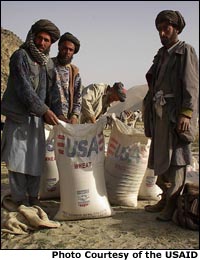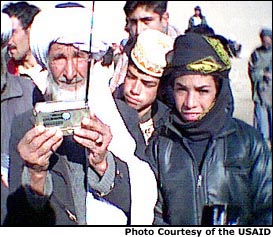
- Afghanistan
- Africa
- Budget Management
- Defense
- Economy
- Education
- Energy
- Environment
- Global Diplomacy
- Health Care
- Homeland Security
- Immigration
- International Trade
- Iraq
- Judicial Nominations
- Middle East
- National Security
- Veterans
- President's Cabinet
- USA Freedom Corps
- Faith-Based & Community Initiatives
- Office of Management and Budget
- National Security Council
- USA.gov
|
Home >
News & Policies >
Policies in Focus
|
As of April 1, 2005 the Afghan Children's Fund is no longer accepting contributions. President Bush thanks those among America's youth who participated for their support.
The U.S. Commitment to the Afghan People
- Helping Afghan Refugees Return Home The Taliban’s oppressive reign and war on women and children has ended. Afghan refugees who fled in fear now wish to return to their homes, and the U.S. is doing everything it can to help these refugees in Pakistan, Iran and other neighboring countries re-enter their homeland.
The State Department’s Bureau of Population, Refugees and Migration (PRM) has already provided a total of $65 million to UN agencies, other international organizations and NGOs to assist Afghan refugees and conflict victims receive health and nutrition services, education for children, teacher training and safe water and sanitation facilities.
PRM has pledged an additional $52 million to support the repatriation and reintegration of Afghan refugees who wish to return to their communities.

- Food Assistance The U.S. government has led a world effort to provide record amounts of food to the Afghan people. As of March 1, the World Food Program has delivered 333,000 metric tons of food into Afghanistan since October 2001.
In December alone, the WFP delivered 116,000 metric tons of food—more than ever before in one month, anywhere in the world. Despite this tremendous success, there are still people in remote areas who need help.
The U.S. will continue to provide food assistance. The U.S. Department of Agriculture (USDA) will provide $45 million in food aid this fiscal year. USAID is providing more than $117 million in food assistance to Afghanistan in this fiscal year.
- Agriculture Agriculture is way of life for 80 percent of Afghanistan’s people, and the United States is committed to helping farmers re-establish production and become more profitable and efficient. Our efforts include rehabilitating the irrigation system and providing the necessary agricultural inputs, including seeds, fertilizer, tools, agricultural equipment and animal vaccines to Afghan farmers.
- Water & Sanitation USAID has contributed more than $8.3 million since October 2000 to address the water and sanitation needs of the Afghan people.
This includes funding the drilling of wells and rehabilitation of water sources, the installation of pipelines and the construction of hand pumps and pit latrines. Afghans have received water purification tablets, soap, and drinking water as well as education on safe hygiene practices, sanitation and waste disposal.
- Critical Infrastructure The U.S. is beginning to rehabilitate key infrastructure, such as roads, bridges, health clinics, schools, government buildings, and markets, as well as the water and sanitation systems in provincial capitals to show that recovery is underway.
USAID, through the French humanitarian organization ACTED, rehabilitated the Salang Tunnel, thus opening a major supply route, allowing greater quantities of goods, services and humanitarian aid to flow more quickly from commercial centers to vulnerable populations. Innovative cash-for-work and food-for-work programs hire Afghans to complete necessary work, thus stimulating the local economy.

- Freedom of Information USAID and International Organization for Migration (IOM) have distributed 30,000 radios and launched the Humanitarian Emergency Afghan Radio Project (HEAR) to provide news and information concerning good distribution, humanitarian aid and security.
USAID is spending $1 million through Internews to train and equip local newspapers, radio and television stations, and Internet providers, as well as support journalist associations and freedom of expression organizations throughout Afghanistan.
USAID is providing funds to VOA for the salaries of 10 Afghan-, Dari-, and Pashto- speaking service correspondents to expand news coverage for the VOA inside Afghanistan.
- Funding the Interim Afghan Government The coalition is committed to helping the people of Afghanistan rebuild their homeland.
Operations of the Afghanistan Interim Authority are being funded through the $4.5 billion that the nation received in pledges from international governments including Germany, Australia, Canada, Denmark, Finland, France, Italy, Japan, the Netherlands, Norway, Russia, Sweden, Switzerland, the United Kingdom and the United States at an international conference.
|
|||||



